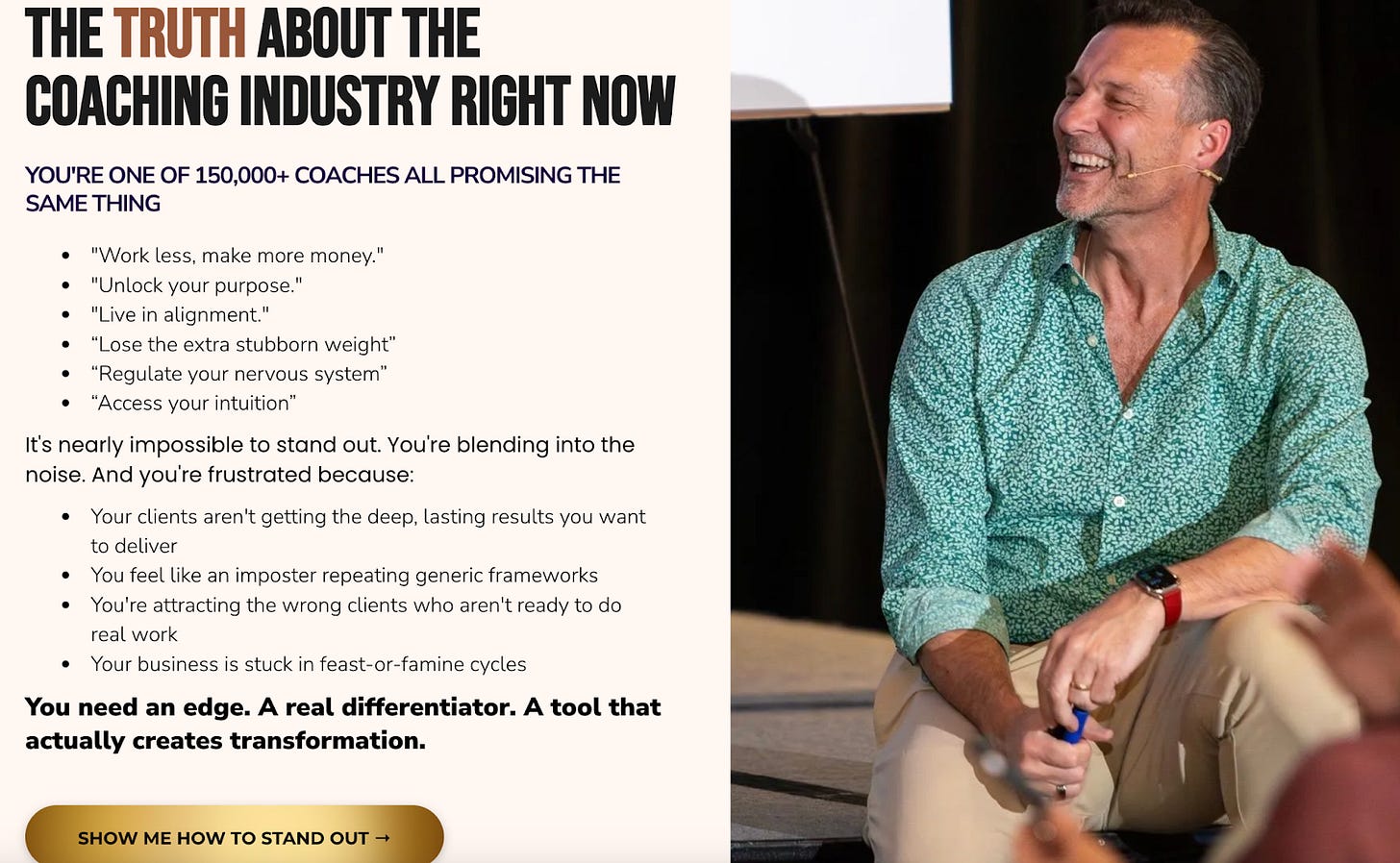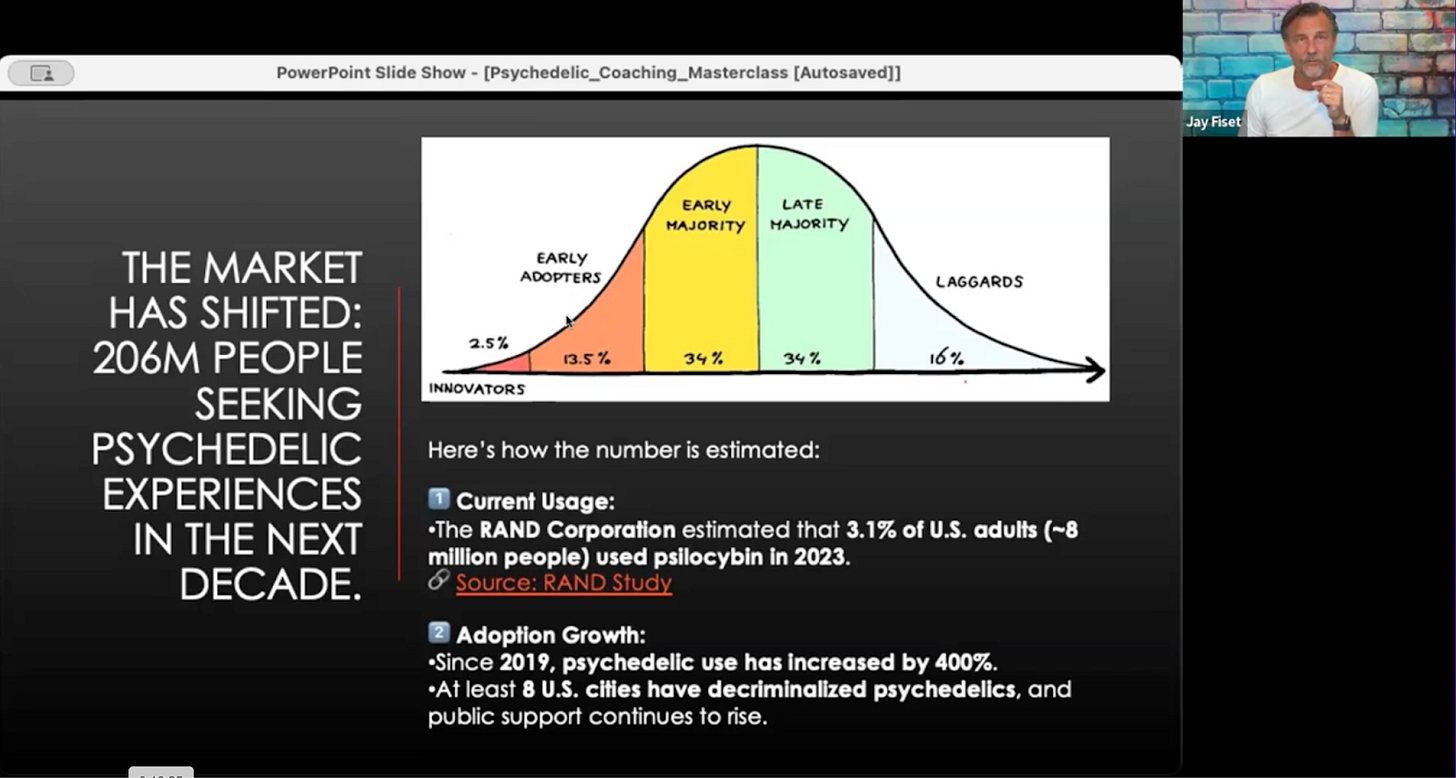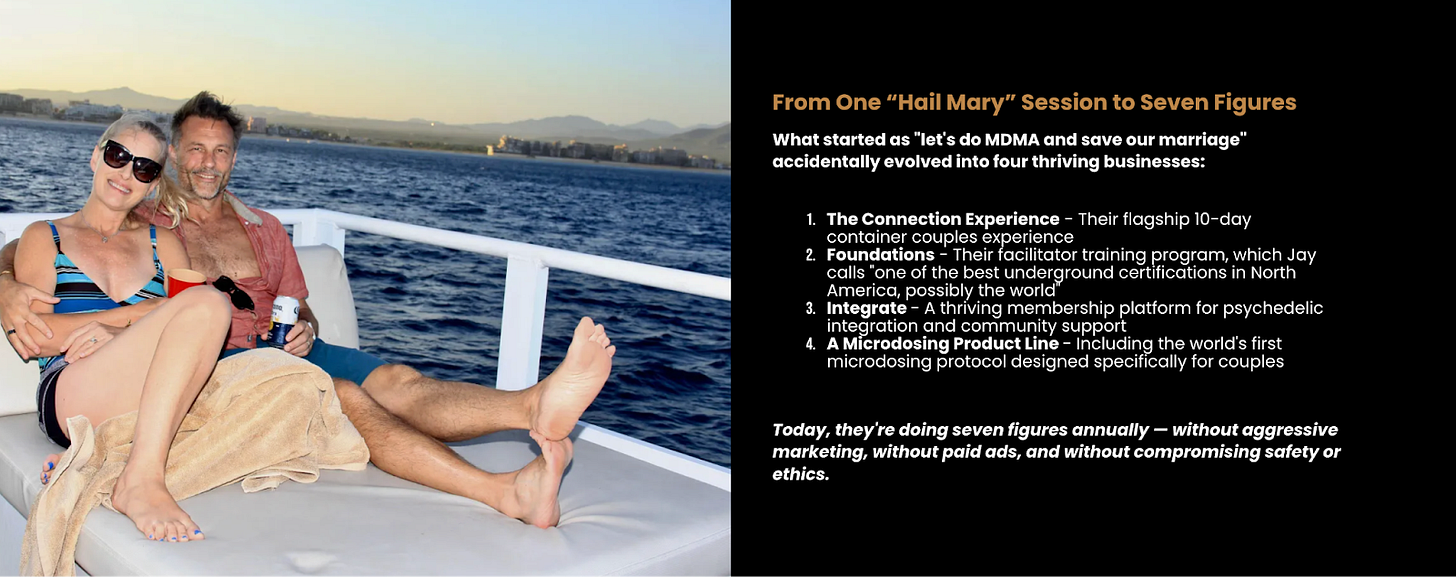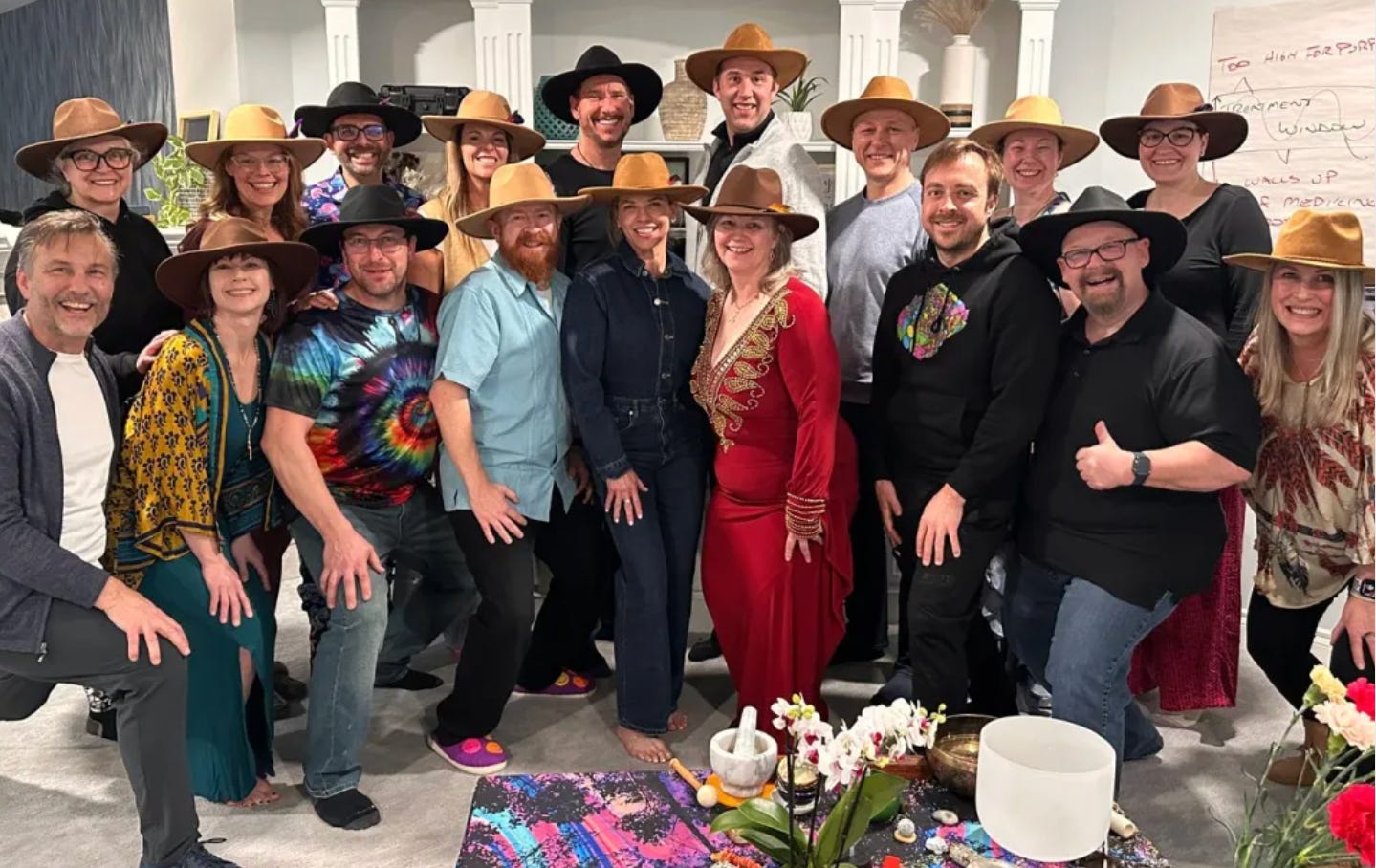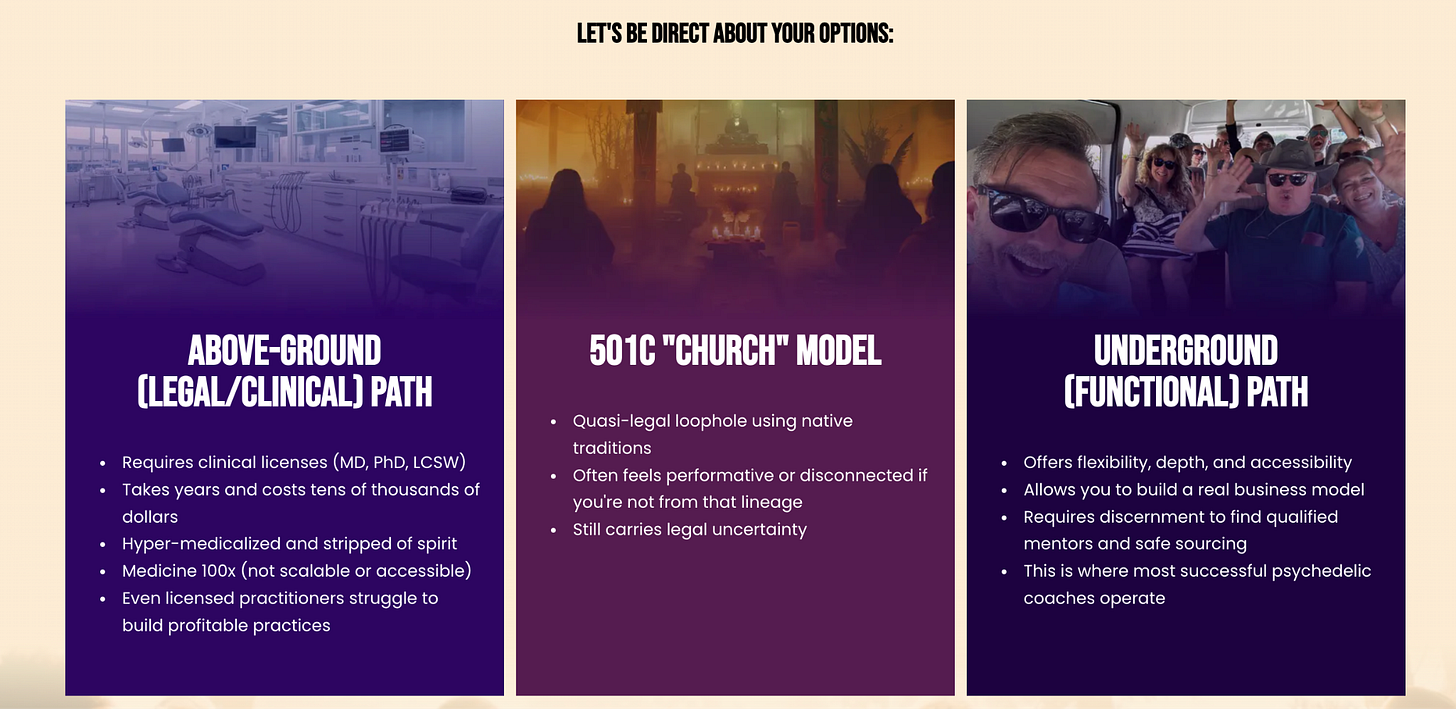Inside the booming 'psychedelic coaching' industry
Secret handshakes and multi-stacking protocols
In this article we’ll look at the world of psychedelic coaching, what it offers, and the potentials and perils it poses for practitioners and clients. I asked some of the world’s experts on coaching and the leading coaching associations what they make of psychedelic coaching, and looked at the only psychedelic coaching course accredited by the International Coaching Federation.
Earlier this week a reader sent me a link for a Psychedelic Coach Accelerator Training Course. The course, run by Canadian couple Jay and Cory Fiset, is an interesting window into the growing psychedelic coaching industry (I have no financial relationship to this or any other course or psychedelic product). The pitch for the course is simple: the coaching industry is getting saturated - the number of coaches rose by 53% between 2019 and 2023, fees are going down, and there’s intense competitive pressure from AI LLMs. So how are coaches going to stand out from the crowd? Well, one way they can is by offering psychedelics. As the website declares:
Jay Fiset argues that we’re just at the very early stages of psychedelic mainstreaming, there’s a huge amount of room to grow, and the biggest market will be ‘healthy normals’ looking to psychedelics for personal growth rather than mental health treatment. That’s where coaches offering ‘functional psychedelics’ come in. He’s written a Functional Psychedelics Manifesto: ‘This is not therapy, this is not ceremony, this is the future of personal evolution.’
Jay and Cory ran a coach training company in Canada for 30 years, then five years ago they took MDMA ‘to save our marriage’. They took a psychedelic coach training program, and now they say they have a seven-figure psychedelic coaching business.
The Fisets offer clients two main ‘protocols’ - one is The Connection Experience for couples, which is an LSD and psilocin session for $2250 (or six for $6000); the other is Blast Off Mastermind, a self-optimization experience involving 3-MMC (metaphedrone), which also costs $2000.
Jay told Tricycle Day magazine:
We took 3-MMC on our anniversary night, and the experience was incredible. We talked for six hours straight, which was remarkable considering we’d already had thousands of hours of conversations in the previous two years. While there isn’t as much scientific data on 3-MMC compared to MDMA, our experience and that of our community suggest it’s a medicine that helps the amygdala go offline and opens the heart.
3MMC was developed in 2012 and appeared as a club drug in Europe. There is hardly any research on it, and 27 reported fatalities.
Then they offer training courses - a $15,000 Foundation course, which includes a seven-page guide to ‘stacking’ different substances (this is from a free public video).
How can students of their program get hold of all these substances? The Foundation course includes a ‘secret handshake’ introduction to two labs, one in the US and one in Canada, which can provide alumni with all their chemical needs. The lab in Canada also supplies the Canadian government, according to Cory Fisit.
If you don’t have time for the Foundation course, the Fisets also offer an Accelerator course, in which coaches can learn how to work with psychedelics, safely, ethically and profitably, in three days. There’s a lot of wackadoodles out there, Jay says, but their course is a ‘no-woo-woo-bullshit’ intro for coaches with integrity and heart. Maybe you’ve worked with psychedelics before and it turned out a mess? No problem. The Fisets can teach you everything you need to set up your business and run it safely, in just three days. They’ll even throw in an authentic facilitator hat.
I am extremely sceptical of any course that claims it can teach people how to safely facilitate psychedelics, especially when ‘multi-stacking’ , in three days. Three years, maybe. But I do at least admire Jay’s candour, because he says the quiet part out loud (I reached out to him on LinkedIn, by the way, but didn’t hear back). Most of the 100 or so psychedelic training courses out there are more coy about what they’re selling and how graduates will monetize their thousand-dollar investment in training. The quiet part is this - most trainees, if they ever work in the space at all, will be working illegally.
That’s not always the case, but it often is, because that’s the market. I might be wrong here, but I don’t think people are spending thousands of dollars on post-trip ‘integration’. My two bits of data for this are, firstly, I understand that ‘psychedelic integration’ is not an often-searched term on Google. Secondly, I understand Beckley looked into launching an integration ‘academy’ and it never got off the ground. What people are willing to pay for is access to the drugs and a guided, ‘safe’ exotic drug experience. Some newbies will pay thousands or even tens of thousands of dollars for that. That’s the market. ‘This’, as Jay Fiset says, ‘is where most successful psychedelic coaches operate’.
2) The psychedelic coaching market seems to be growing.
What exactly is ‘psychedelic coaching’? It can mean different things. Some psychedelic coaches guide clients before, during and after trips, others just before and after. Some work with psychological problems like PTSD, others are more focused on creativity, leadership or self-optimization. It’s quite of the moment - tune in, turn on, ramp up - but there are also historical precedents. In the 1950s, Gerald Heard, a friend of Aldous Huxley’s, gave LSD to clients including the chairman of Southern California Edison Company and the CEO of Time-Life.
There are no official figures, but it seems like the psychedelic coaching industry is growing. If you search on Linkedin, Instagram or Google you’ll come across many people openly advertising themselves as psychedelic coaches and offering their clients experiences either in-person or on Zoom. There are psychedelic coach training schools like Paul F. Austin’s Psychedelic Coaching Institute, Joshua White’s Fireside Coaching, Lorna Liana’s Plant Medicine School and Deanne Adamson’s Being True To You.
There are podcasts run by psychedelic coaches like Beth Weinstein, Paul Austin and Lana Pribic (all of which I’ve been a guest on) or blogs like The Dose Coach. There’s mainstream media coverage of psychedelic coaching in Bloomberg, Fortune, Wired and the BBC. There are retreats for executives like ‘the psychedelic CEO’ or Virgil Klunder’s $40,000-$1 million ‘clarogenics’ retreats, which I wrote about on Monday.
Then there are the more general psychedelic facilitator training programs like Vital, CIIS, Synthesis and so on, many of whose graduates will work as underground coaches. And there are underground MLM networks like that of the ‘millionaire shaman’, a California business coach who rebranded himself as a third-generation shaman in the Noughties. He has a network reportedly of 500-800 people, mainly in the US, some of whom facilitate ‘medicine circles’ using his products. The facilitators pay him for training, pay him for his products, and pay him 20% of their revenues. No wonder he’s the millionaire shaman!
This is not just the wild fringe of the coaching industry. Some of the most famous coaches in the world are vocal about the power of psychedelics. Jack Canfield, author of Chicken Soup for the Soul, spoke of how much ayahuasca retreats at Rythmia have helped him when he appeared on Tim Ferris’ podcast this week. Ferris himself has done a huge amount to promote the use of psychedelics in the coaching and self-optimization industries with comments like ‘The billionaires I know, almost without exception, use hallucinogens on a regular basis’ (a quote from this CNN interview in 2015).
3) What do coaching experts and coaching associations have to say about psychedelic coaching?
The $7-billion coaching industry has never been regulated by governments, but self-regulating associations emerged in the early 1990s. A group of European coaches including David Clutterbuck founded the European Mentoring and Coaching Council (EMCC) in 1991, while American coach Thomas Leonard founded the International Coaching Federation (ICF) in 1995. These associations offer accreditation, training, ethics codes and complaint procedures, and were attempts to professionalize the industry to make it more palatable to big corporate clients.
In the last few years the coaching industry has boomed. The ICF says the number of coaches rose 54% between 2019 and 2023, i.e during the pandemic and the rise of Zoom. Professor Jonathan Passmore, an expert on coaching and author of 30 books about it, tells me:
There are probably somewhere in the region of 150,000 people who have some form of coaching qualification, and there are probably another 150,000 who use the term coaching on their LinkedIn or on their CV, or engage in some type of paid coaching work. It’s a completely unregulated market, and you have people at one end of the spectrum who have degrees and are chartered psychologists, to people at the other end who work with crystals or dolphins.
The ICF says coaching revenue rose 60% between 2019 and 2022. But with so many new coaches, fees have fallen from an estimated average of $1000 a session to $200 a session (according to Passmore). The average coaching salary in the US is $40,000 a year, which is $26,000 below the national salary average. As Jay Fiset points out, the coaching market seems to be getting saturated, and is now under intense pressure from AI. So how can coaches stand out? Psychedelic coaching is certainly one way.
I was curious - what do coaching experts and coaching associations think about the rise of psychedelic coaching? I reached out to some of the leading coaching authorities and associations to ask them.
‘Every coaching code of ethics says coaches should obey the law. Is what the coach doing legal, is it in the best interests of the person coming to them for that service, are they made aware of the risks of whatever substances they have taken?’ - Professor Jonathan Passmore
More after the paywall. Plus, what are the pros and cons of psychedelic coaching, and is it possible to be an ethical psychedelic coach?


